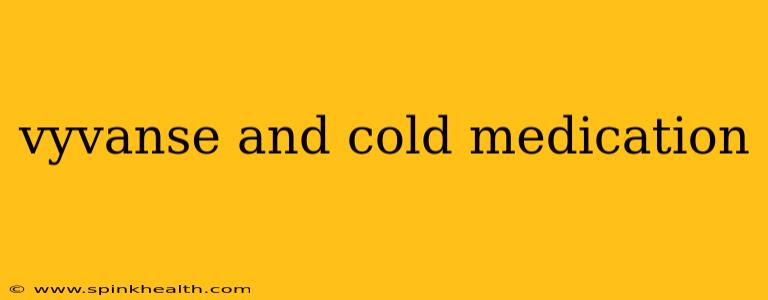The sniffles, the coughs, the aches – cold season is nobody's favorite time of year. And if you're managing ADHD with Vyvanse, navigating cold symptoms adds another layer of complexity. Mixing medications, even seemingly innocuous ones like cold remedies, with Vyvanse requires caution and, ideally, a conversation with your doctor or pharmacist. This isn't just about avoiding unpleasant side effects; it's about ensuring your health and safety.
My journey with ADHD and the occasional winter cold has taught me a lot about managing both simultaneously. I've learned that a little bit of knowledge can go a long way in preventing unnecessary complications. This isn't medical advice, of course – always consult your healthcare provider – but sharing my experiences and the information I've gathered might help you navigate this tricky situation.
Can You Take Cold Medicine with Vyvanse?
This is the million-dollar question, isn't it? The short answer is: it depends. Many common cold medications contain ingredients that can interact negatively with Vyvanse (lisdexamfetamine). These interactions can range from mild discomfort to serious health risks. The key is understanding what's in your cold medicine and how it could affect the way Vyvanse works in your body.
What Cold Medicine Ingredients Interact with Vyvanse?
Several ingredients found in over-the-counter (OTC) cold medications can cause problems when combined with Vyvanse. These include:
-
Decongestants (like pseudoephedrine or phenylephrine): These can raise your blood pressure and heart rate, effects that are amplified when combined with a stimulant like Vyvanse. This combination could lead to dangerously high blood pressure or an irregular heartbeat.
-
Antihistamines (like diphenhydramine or chlorpheniramine): While generally considered safe, some antihistamines can cause drowsiness, which can counteract the stimulating effects of Vyvanse, or even exacerbate existing side effects.
-
Cough suppressants (like dextromethorphan): The interaction between dextromethorphan and Vyvanse is less well-studied, but caution is advised, as combining central nervous system stimulants can lead to unpredictable effects.
What are the Potential Side Effects of Combining Vyvanse and Cold Medicine?
The potential side effects of combining Vyvanse and certain cold medications can vary greatly depending on the specific ingredients and dosages involved, and your individual sensitivity. However, some possible side effects include:
- Increased heart rate and blood pressure: This is a significant concern, particularly for individuals with pre-existing cardiovascular conditions.
- Insomnia or sleep disturbances: Stimulants and some cold medications can disrupt sleep patterns, leading to fatigue and reduced cognitive function.
- Anxiety and nervousness: The combined effects of stimulants can intensify feelings of anxiety and nervousness.
- Increased risk of seizures: In rare cases, the combination could increase the risk of seizures, particularly in individuals with a history of seizures.
- Reduced effectiveness of either medication: The interaction could diminish the effectiveness of either Vyvanse or the cold medication.
What Should You Do if You Need to Take Cold Medicine While on Vyvanse?
Talk to your doctor or pharmacist first. This is crucial. They can assess your specific situation, taking into account your medical history, current medications, and the ingredients in your chosen cold medicine. They can help you find a safe and effective alternative or adjust your dosages accordingly.
- Consider the individual ingredients: Read the labels carefully and look for cold medications with fewer interacting ingredients. Some allergy medications may be less problematic than those containing decongestants or cough suppressants.
- Start with the lowest effective dose: If your doctor approves, start with the lowest possible dose of both Vyvanse and the cold medication to minimize potential side effects.
- Monitor your symptoms closely: Pay close attention to how you feel after taking the medications. If you experience any concerning side effects, stop taking them and contact your doctor or pharmacist immediately.
What are some safe alternatives for cold symptoms?
Instead of reaching for a multi-symptom cold medication, consider these alternatives:
- Plenty of rest: This is often the best treatment for a cold.
- Hydration: Drink plenty of fluids to help thin mucus and prevent dehydration.
- Over-the-counter pain relievers (like acetaminophen or ibuprofen): These can help manage fever and aches, but be sure to check for interactions with Vyvanse.
Remember, this information is for educational purposes only and does not substitute for professional medical advice. Always consult your healthcare provider before combining medications, especially if you have any pre-existing health conditions. Your health is paramount, so prioritize careful consideration and professional guidance.

